What’s in Your Shed? visits a Yorkshire contractor
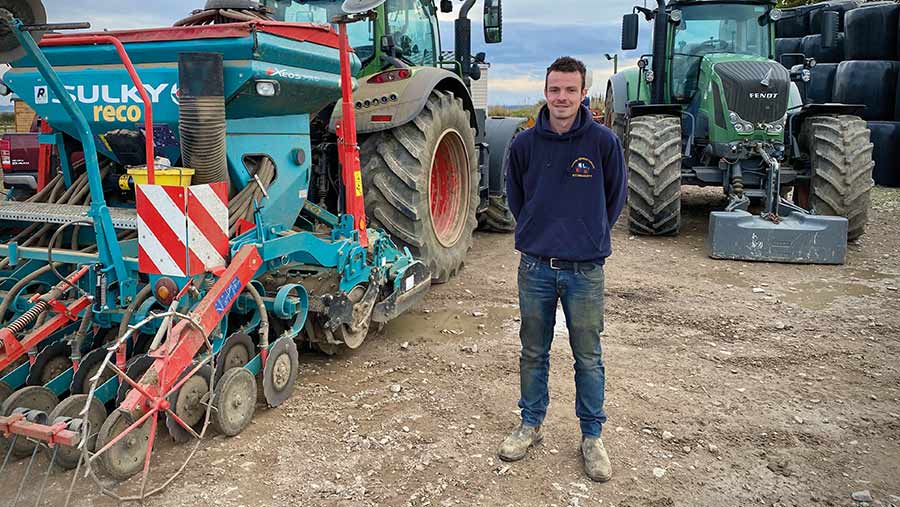 James Douthwaite © MAG/Oliver Mark
James Douthwaite © MAG/Oliver Mark Contractor James Douthwaite is the latest to open his shed doors for our monthly What’s in Your Shed? series.
Our WIYS team have been all over the country, and this time we park up at Kirkby Overblow, near Harrogate in Yorkshire.
See also: Driver’s view: WD Douthwaite’s Kverneland 53100MT
Farm facts
DW Douthwaite & Partners, Kirkby Overblow, near Harrogate, Yorkshire
- Farm size 445ha
- Cropping Winter wheat, winter barley, winter oilseed rape
- Stock 1,000 ewes
- Contracting 800ha mowing, 10,000-15,000 round bales, 4,500 big square bales, cultivation and drilling, potato work, fertiliser spreading, hedgecutting
- Staff Chris, James and Alan Douthwaite
How did you get started?
I decided to do some contracting while working on our family farm after leaving Bishop Burton College in 2012.
It started with 200 round bales for a neighbour and has gradually increased over the years to the point that I’m now making 15,000 bales annually with the help of my dad and uncle.
I ran a lean outfit to begin with, using our Vicon round baler and a Renault 836, and I took every job I could get.
Things have changed since then and, with a lot of local farmers switching to bedding down with Spread-a-Bales, demand for big square bales rose.
To get in on that, we’ve hired a New Holland 1290 for the past couple of years. We don’t have enough work to justify buying one and it means it’s not my responsibility to fix breakdowns.
The baling work led to mowing.
For seven years we ran a 3.2m-wide Vicon trailed, but it couldn’t keep up as our acreage grew, so we bit the bullet a few years ago and switched to a set of Kverneland triples.
It was a massive investment, but has revolutionised the job and I can breeze through big blocks of land in no time.
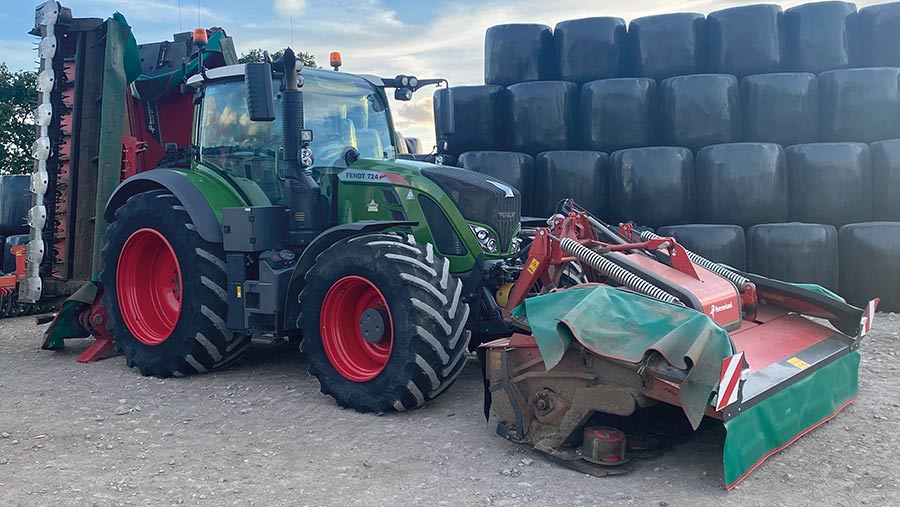
KV triples take care of up to 800ha of mowing annually © MAG/Oliver Mark
I do a bit of potato work, too. I drove a destoner for a few years, which helped buy the Fendt 724, and I still cart in the autumn.
We also do some discing, ploughing and drilling, but it can be expensive work – the clay soil around here eats through wearing metal.
How brand loyal are you?
We know what we like and, when we find the right machine, we stick with it – though a lot of that comes down to the dealer.
We ran Renault tractors for a long time, but since 2015 we’ve had Fendts and we are unlikely to change – they’re good to drive, reliable and our local dealer, Brockhills, is brilliant.
Vicon round balers had been on the farm since time began, but that changed when I had to wait five days for the dealer to sort a breakdown in the middle of the season.
When it came to replacing it, we switched to Fendt – though it might have been good bit dearer, we know we have the backup
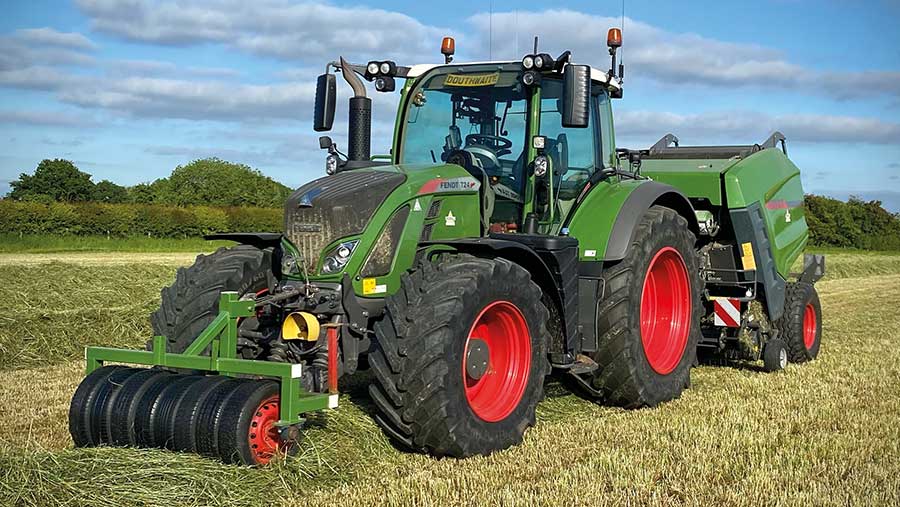
Round baling is now the business of a Fendt Rotana © MAG/Oliver Mark
Favourite dealer?
Brockhills of Yorkshire at Thirsk – we’ve had five Fendt tractors off them now, plus the baler.
Their support is second to none and they’ll always help us out, no matter whether it’s first thing in the morning or a Sunday night.
I like the fact that it is a single-depot family business, and we have a great relationship with the people there.
They’ve always got parts in stock, will have someone out to us in 45mins if necessary, and will lend us some kit if there’s a major problem.
Favourite piece of kit?
The Kverneland triple mowers, which eat through the acres. I can knock down 80ha in a good day, which is more capacity than we need at the minute, but means we can always take on a bit more.
That said, it didn’t start well. Farmstar delivered them straight to the field as I was already busy mowing, and I was buzzing at the thought of hooking them on and crashing through the rest of the work.
The wagon took away the old Vicon mower and I put the new ones on to my tractor, but I couldn’t get them to fold down.
I wasted a whole afternoon trying to get them to function – with the farmer chewing my ear off about getting his grass cut.
In the end, I left the butterfly unit in the middle of the field and had to use the front one to get finished.
The problem was a crack in the valve block, so the whole hydraulic system was replaced. They haven’t put a foot wrong since.
Least favourite piece of kit?
A New Holland 377 little square baler, which caused an argument every time it came out.
Dad used to make about 4ha of little hay bales, but few people ended up wanting them and we had to stack them all by hand – it was a right pain in the backside.
The baler ended up sitting idle for three years, so I got rid of it and we started making big bales instead.
We still need a few little bales for our livery yard, but it is much easier to buy them off someone else.
Latest purchase?
We bought a 6,000-hour Fendt 828 earlier this year to reduce the workload of the 724.
It was being used for everything, averaging almost 1,500 hours/year on mowing, baling, cultivations and drilling.
On some days I found myself changing implements up to seven times, which was a complete waste of my time.
Hopefully, the 828 can pick up some of the slack and reduce the hours going on the 724, which should mean it’s worth a bit more money when we come to sell it.
It cost £50,000, plus a Renault Ares 826 trade-in, which isn’t a lot for 280hp.
The extra power should come in handy for mowing and baling, particularly on the hilly land where the 724 is often at its limit.
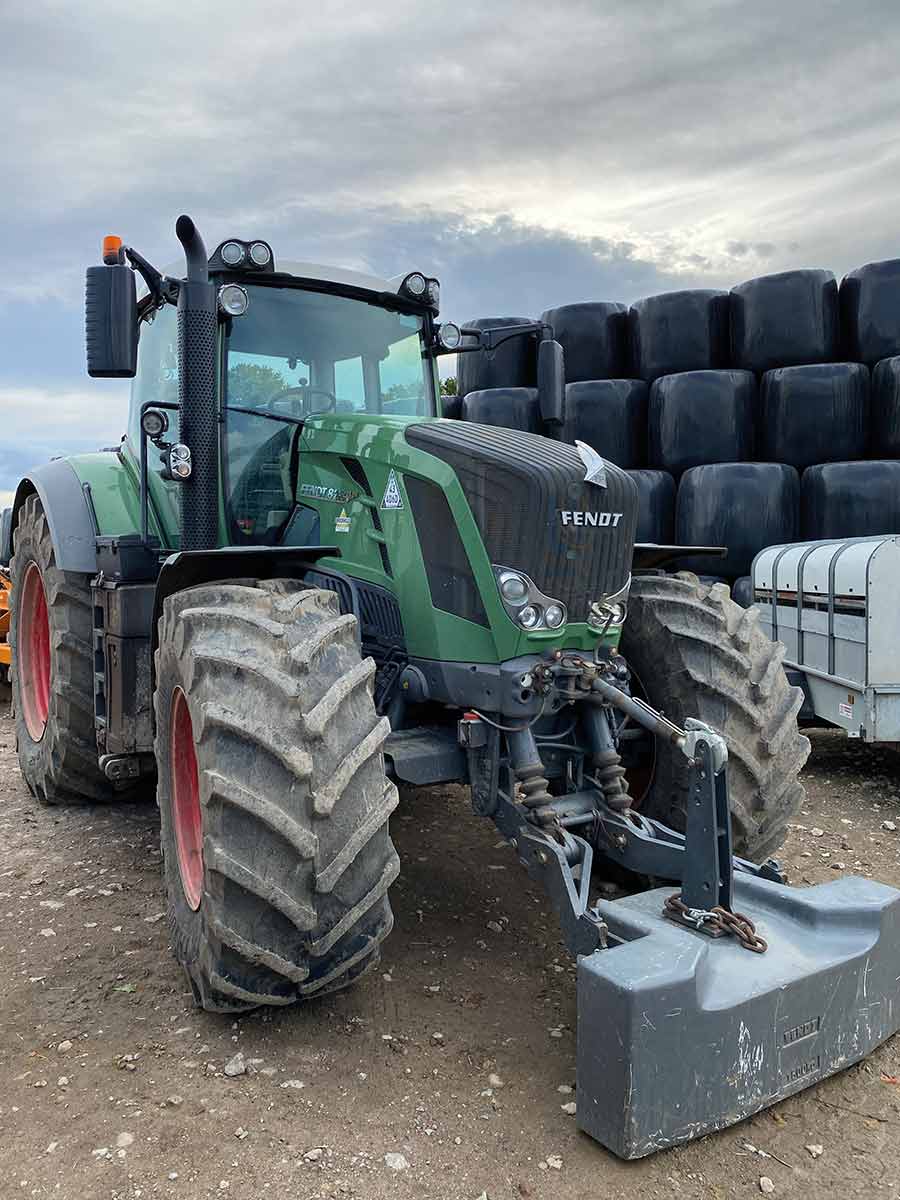
Fendt 828 © MAG/Oliver Mark
Oldest machine still at work?
Dad… and a Massey Ferguson 35, which permanently sits on the Superior mill-and-mix machine.
We process about 500kg of feed every week for our show sheep, so it gets turned on, revs its arse off for 10 minutes, and is then turned off.
But it starts first time, every time, so there’s no point having anything fancier.
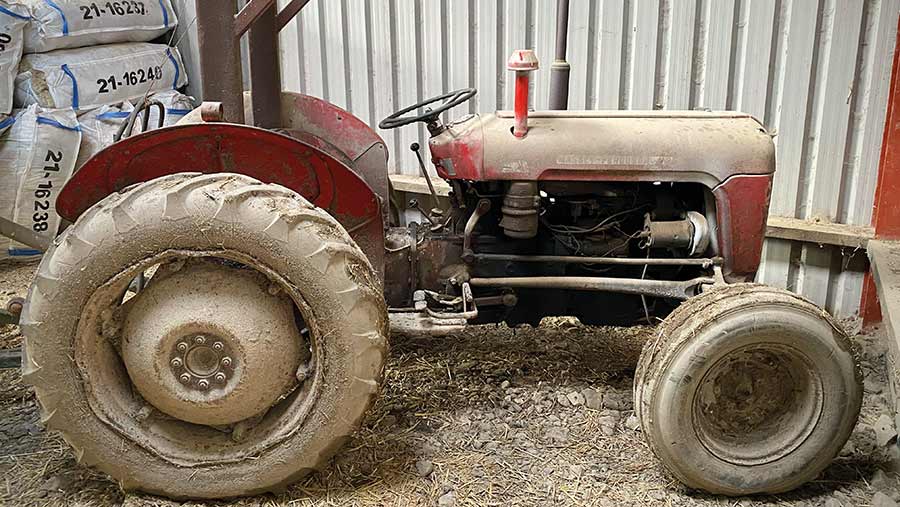
A Massey Ferguson 35 still mills feed every week © MAG/Oliver Mark
How long do you keep your machines?
The frontline stuff usually stays until the end of its warranty, which will be five years for the 724 and three years for the round baler.
That said, it would be good to keep the Rotana an extra year given it cost a bit more than the Vicon before it, though we’ll make that decision nearer the time.
The tedder and mowers will probably stay for five years, but it depends on their workloads.
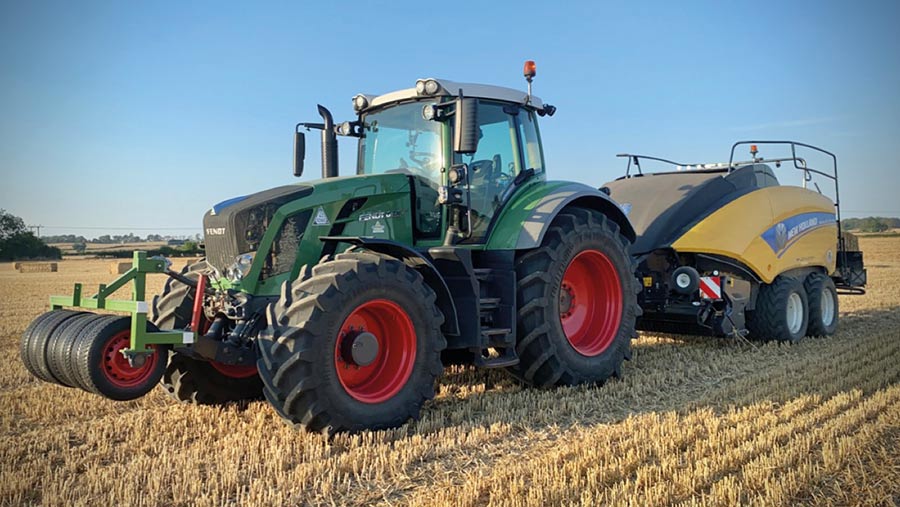
Fendt 724 and square baler © James Douthwaite
Next on your wish list?
A Fendt 724 with the new cab would be nice, but our current one is only in its third season.
More realistically, it might be a direct drill. I like the idea of direct drilling – the fact that one man and one machine can establish a crop in a single pass seems so much more efficient than our system.
The problem is that we don’t do enough drilling at the moment to justify buying one without trading in the Sulky combi, which feels like a bit of a gamble.
I don’t think all our customers would be keen on it and we’d have to find a lot of work to justify the cost.
Plus it will be hard to find the acres around here, as there’s not a lot of arable land.
A few direct drills have popped up in the area over the past few years, but most have ended up being switched back to a combi.
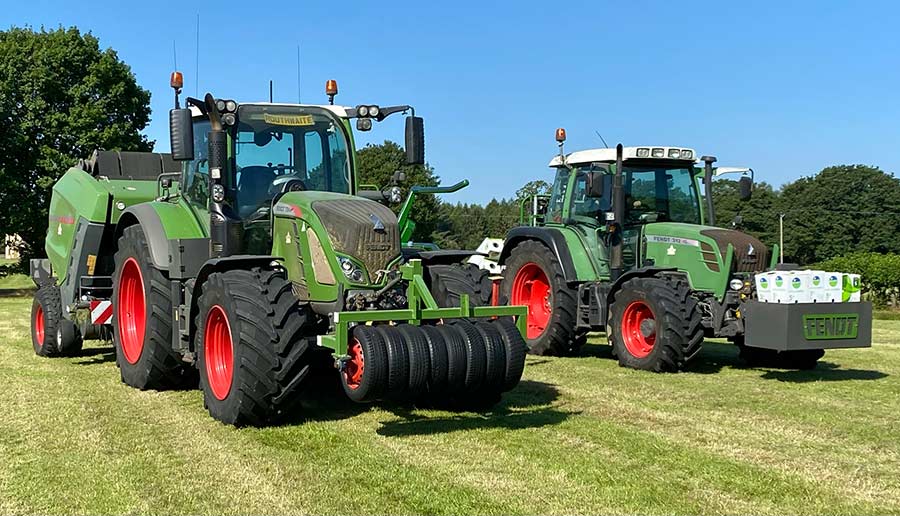
The Fendt 312 (right) hasn’t put a foot wrong in seven years and 3,000 hours © MAG/Oliver Mark
Biggest machinery mistake/most embarrassing incident?
We bought a brand-new rake five years ago and, just seven acres later, it was in a ditch.
The driver had pulled off the main road towards a track, but the tractor plopped into the ditch – which was fairly well hidden, to be fair – and the rake followed.
We tried pulling it out forwards, but that twisted the headstock and the whole lot nearly toppled over.
A local farmer ended up lifting the rake with his Loadall while we dragged the tractor out.
It could have been a lot worse, but it was still tough to stomach given it was in showroom condition and we ended up having to spend £1,000 on a new headstock.
Most expensive repair bill?
Our Renault Ares 836 had a lot of money spent on it over the years – it simply wasn’t reliable enough for contracting, which is why we went for the 724.
But the worst offender was a Claas Celtis 446; it ate money.
It was almost guaranteed to go through a gearbox and four-wheel-drive system every year, and we knew a few other people with the same tractor and the same problems.
The last time it happened it was a week out of warranty, and it was the third year on the trot that the same issue occurred.
We refused to pay, and it all got a bit messy – Claas stopped our account and someone from Germany ended up coming over for a chat around the kitchen table.
We agreed to pay half of the bill, but it left a sour taste.
Most overpriced spare part?
Sulky power harrow tines for the combi drill are £28 apiece. It’s a good drill, but the parts are expensive and, worse still, they’re a nightmare to get hold of.
I’ve had to drive to Ancroft Tractors at Berwick to get them, which is the best part of a six-hour round trip. It makes the Mzuri a bit more appealing…
Best invention?
We built a crop roller for the tractor’s front linkage that presses big swaths down ahead of the baler.
It was cheap to make – a long ram from a JCB loader carries a row of old car wheels that came from the scrapyard, all held in a box section frame that is strong enough to nudge bales out of the way if they’re blocking my turn on a headland.
We spent about £50 in total and it does a great job of pressing the crop down and evening up the feed. It often means we can drive a bit faster, too.
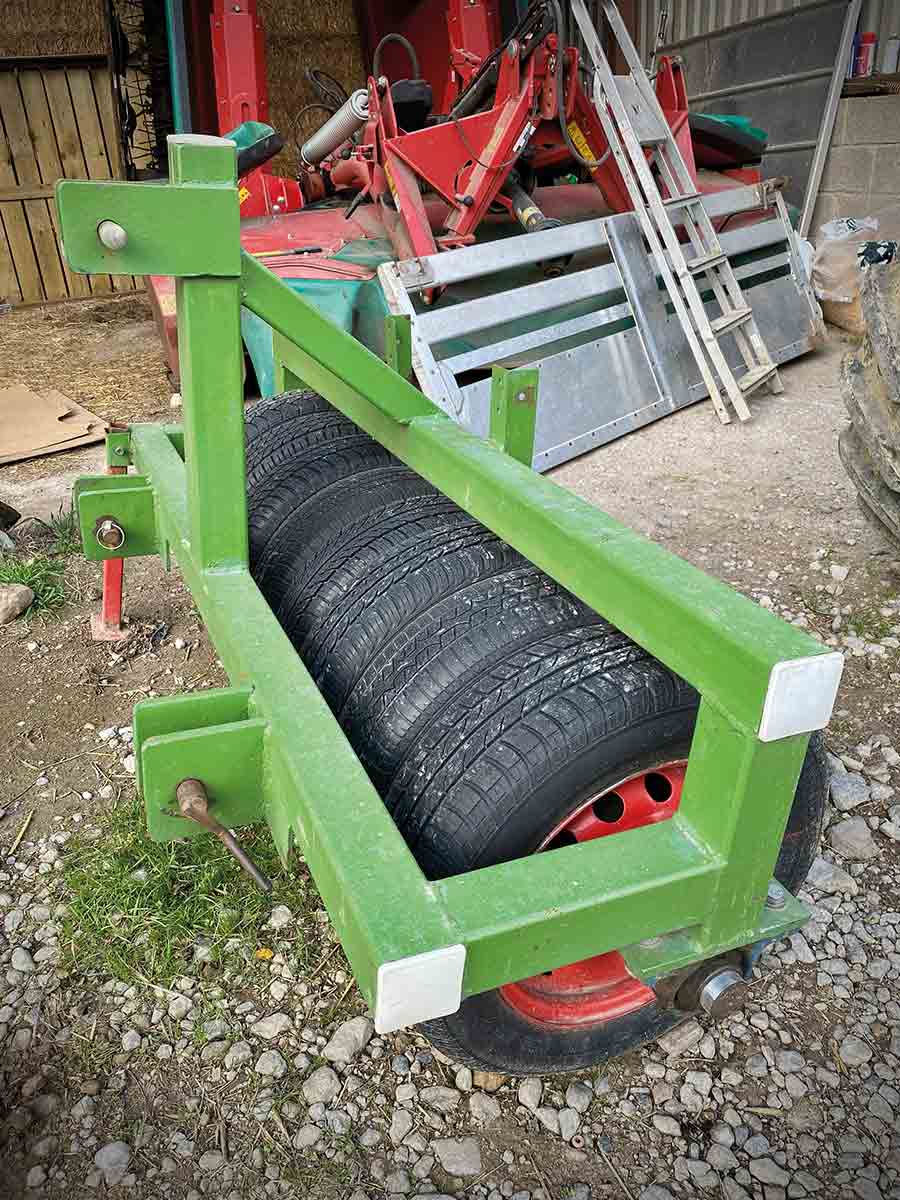
Best invention © MAG/Oliver Mark
What couldn’t you live without in the workshop?
Gas bottles and the compressor, though we’ve now got a cordless leaf blower to clean off the balers between straw jobs.
Favourite job and least favourite job?
Favourite: A toss-up between round baling and mowing.
Least favourite: Muckspreading.
What’s your everyday transport?
A 13-plate Isuzu D-Max with a 2.5-litre engine. It’s basic and more like a tractor than a car, but it does the job.
Dad has a 67-plate, 2.5-litre Nissan Navara, which is more powerful and has always towed the sheep trailer.
But it won’t do as much work anymore, as we recently bought a three-deck, 28ft stock box that sits on a flatbed trailer purpose-built by Langley Trailers in Durham.
Best tractor you’ve had?
Based on reliability, it would have to be one of the two Fendt 312s. Dad’s one – a 2008 model – has been faultless in the seven years we’ve had it, with not a single oil leak or breakdown.
It still does all the wrapping and tedding, plus its fair share of trailer work.
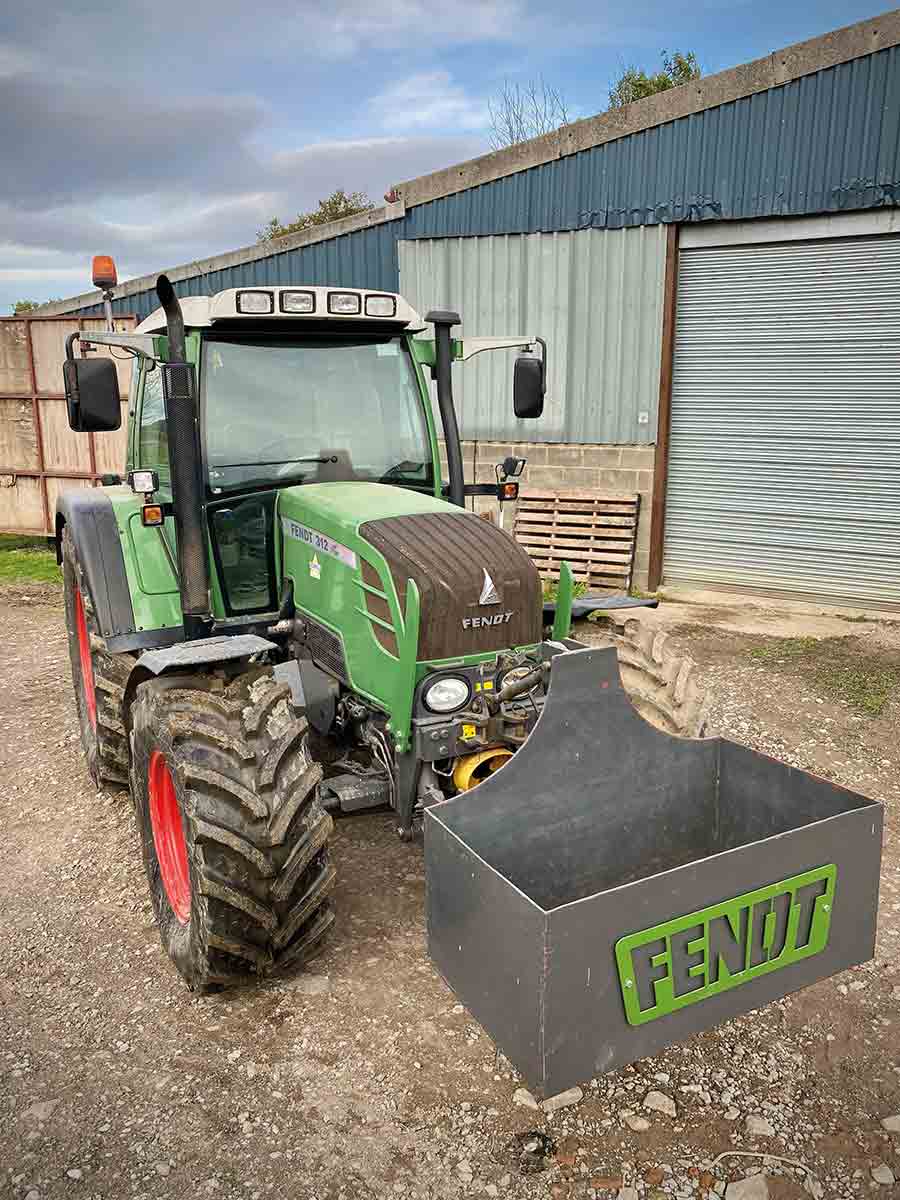
Fendt 312 © MAG/Oliver Mark
Worst tractor you’ve had?
The Claas Celtis 446 mentioned earlier.
All the Renaults we’ve had have suffered from constant niggly problems too, but we weren’t under so much pressure before we started contracting, so it wasn’t such an issue.
Now we’re flat out and working long hours during peak periods, so we can’t afford any downtime.
Biggest machinery bargain?
It would probably be the 312. It came on 4,500 hours for £28,000 and, seven years and 3,000 hours later, must still be worth the best part of £25,000. We’ll keep it for as long as we can.
Kit list
- Tractors Fendt 828, 724, 312 x2 and Massey Ferguson 35
- Telehandler JCB 536-60 Agri-Super
- Forage equipment Kverneland 53100 MT and 3332 FT mowers, Krone KWT 1300 tedder, Krone Swadro 760 rake, McHale 991 wrapper
- Balers Fendt Rotana 160V, New Holland BB1290 Plus
- Cultivation kit Simba X-Press 4.6m, Kuhn Multi-Master 122 five-furrow plough
- Drill Sulky Xeos Pro 3m
- Fertiliser spreader KRM M35W
- Trailers Stewart 14t, 30ft straw trailers x2, 28ft three-deck livestock box
- Other Maschio Bufalo topper, Superior mill-and-mix
